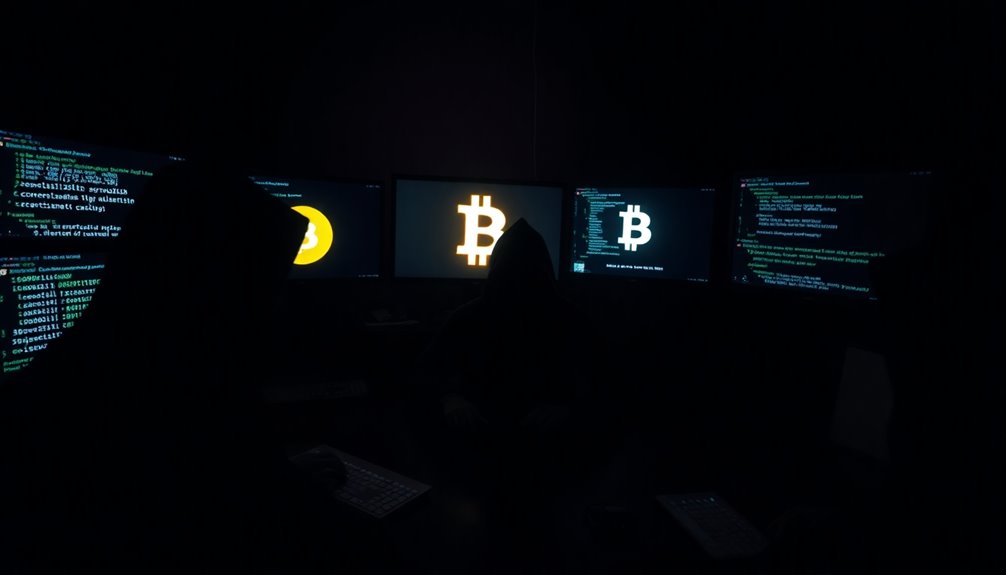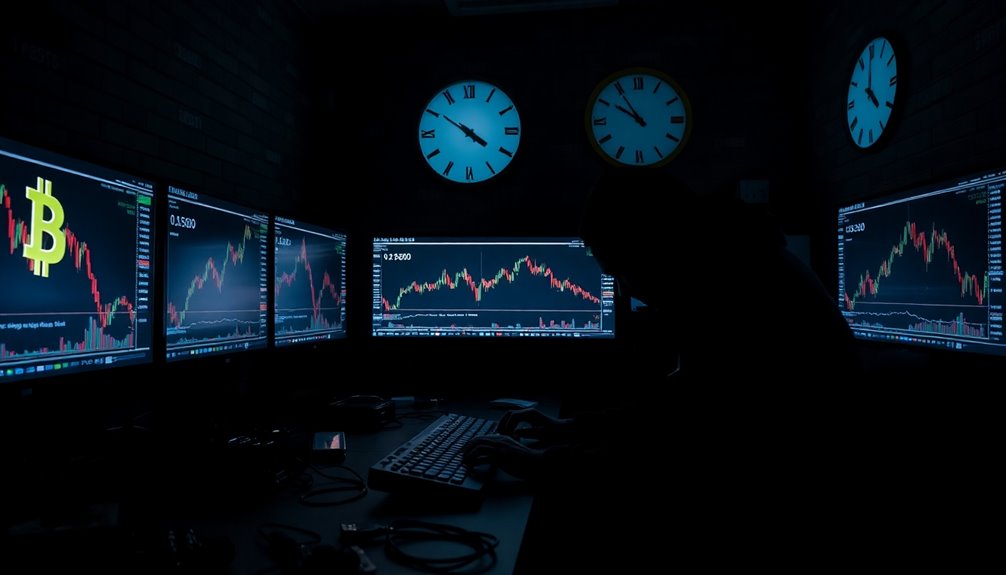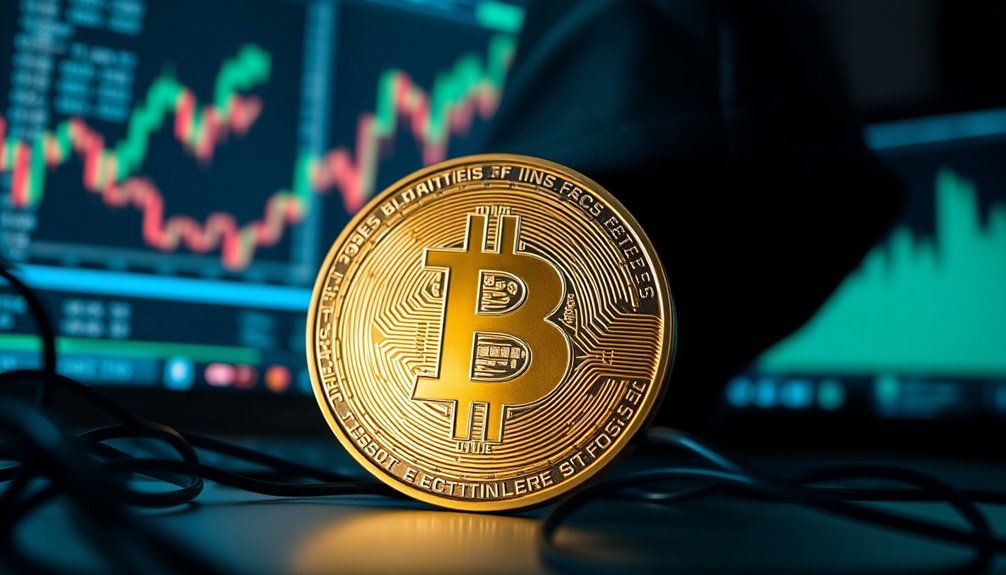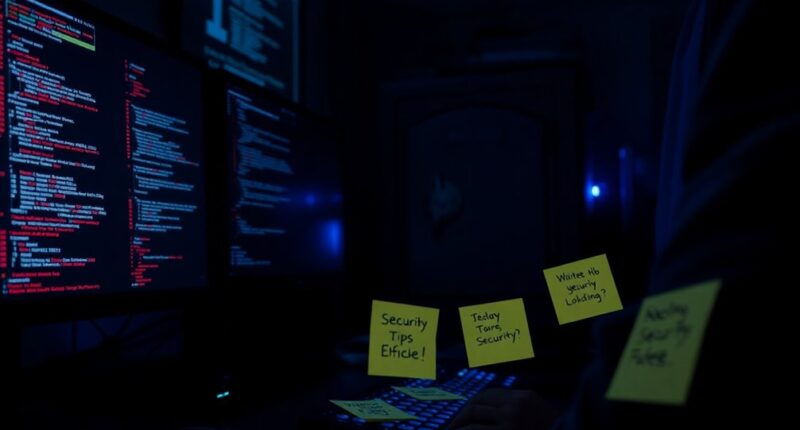Hackers are targeting Bitcoin wallets with brute force attacks, exploiting weak passwords and compromised private keys. To stay safe, use strong, unique passwords for each wallet and enable two-factor authentication. Regularly back up your private keys or seed phrases and store them securely offline. Test these backups frequently to ensure they work. Distributing your backups across different media can further reduce risks. With recent breaches highlighting vulnerabilities in both decentralized and centralized platforms, implementing robust security measures is more crucial than ever. Discover how you can enhance your wallet's protection and navigate potential threats effectively.
Key Takeaways
- Hackers often use brute force attacks to guess weak passwords, targeting wallets with insufficient security measures.
- Enable strong, unique passwords for wallets and consider using a password manager to enhance security.
- Two-factor authentication adds an extra layer of protection, making it harder for hackers to gain access.
- Regularly back up private keys or seed phrases offline and test them to ensure they remain functional.
- Stay informed about cybersecurity threats and continuously adopt robust security measures to protect assets.
Wallet Security Essentials Explained

When it comes to securing your Bitcoin wallet, understanding the essentials is crucial, as even small oversights can lead to significant losses.
Start by regularly backing up your private keys or seed phrase and store them offline in secure locations. Distributing backups across different media minimizes risks. Additionally, it's advisable to test backups periodically to ensure functionality.
Use strong, unique passwords for each wallet, incorporating a mix of characters, and consider using a password manager for safe storage.
Enable two-factor authentication for an added layer of protection—always choose secure methods.
Keep your wallet software updated to eliminate vulnerabilities, and consider using hardware wallets for long-term storage, as they keep your private keys offline, significantly boosting your security.
Prioritize these steps to safeguard your investments effectively.
Recent Cybersecurity Breaches Reported

As cybercriminals become increasingly sophisticated, recent cybersecurity breaches in the cryptocurrency space have raised alarm bells across the industry.
North Korean hacking groups have stolen over $659 million, specifically targeting platforms like DMM Bitcoin and WazirX through social engineering and malware. This aggressive targeting of the cryptocurrency industry is part of a broader strategy to finance the North Korean regime. Additionally, the rise of trading bots has introduced new vulnerabilities, as automated systems can be exploited if not properly secured. The cryptocurrency sector is becoming increasingly aware of these threats, prompting initiatives to strengthen security measures. One notable response is the chainalysis antifraud efforts expansion, which aims to enhance tracking capabilities and detect suspicious transactions more effectively. As hackers adopt more sophisticated techniques, ongoing collaboration between exchanges and security firms is essential to safeguard user assets and mitigate the risks posed by malicious actors.
In 2024, private key compromises accounted for nearly 44% of all stolen crypto, highlighting the importance of securing your private keys.
Decentralized finance (DeFi) platforms have historically been vulnerable, but centralized services are now at risk, as seen with notable hacks causing DMM Bitcoin to shut down.
With these trends, it's crucial to stay informed and adopt robust security measures to protect your assets from these ongoing threats.
Bitcoin Price Fluctuations

Bitcoin price fluctuations can be attributed to a complex interplay of factors, including supply and demand dynamics, market sentiment, and technological advancements.
With a fixed supply of 21 million coins, you'll notice significant price swings as demand changes. Events like block halving every four years impact supply and demand, resulting in volatility. Additionally, changes in market conditions can rapidly influence the price as traders respond to shifts in supply and demand.
Positive news can boost investor confidence, while negative reports trigger sell-offs. Additionally, Bitcoin's decentralized nature makes it hard to gauge collective market mood, contributing to erratic price movements.
In times of economic uncertainty, many investors turn to Bitcoin, further influencing demand.
Finally, technological upgrades or security breaches can sway prices, making it crucial for you to stay informed about these developments.
Corporate Investment Strategies

The volatility in Bitcoin prices has drawn attention not just from individual investors but also from corporations that see opportunities in the evolving economic landscape. To stay competitive, you should prioritize investment areas that influence economic networks, focusing on chokepoints and sectors vital for national security. Emphasizing long-term development of technologies is crucial, as is integrating best practices from the commercial sector. This requires leveraging both quantitative and qualitative methods to spot impactful investments. Additionally, adopting a portfolio-of-investments approach to manage diverse arenas effectively. Maintaining transparency in your decisions and continuously improving your assessment tools to ensure your investments align with national security goals is essential, especially considering that private keys must be securely managed to protect against vulnerabilities in your cryptocurrency holdings. Furthermore, understanding the tax implications of your investments can help optimize your financial strategy.
Election Impact on Bitcoin Prices

With the approaching elections, it's crucial to recognize how political outcomes can significantly influence Bitcoin prices. A Trump victory could lead to a surge in Bitcoin, potentially reaching $125,000, thanks to favorable regulatory expectations and increased ETF inflows. Analysts from Bernstein maintain a bullish long-term price target of $200,000 by 2025, suggesting that the market's trajectory may be more resilient than some anticipate.
Conversely, a Harris win might spark concerns about stringent regulations, testing Bitcoin's support around $50,000. You might notice that Bitcoin prices closely track election odds, with recent fluctuations reflecting investor sentiment. As you navigate this volatile landscape, remember that speculation drives price movements more than fundamentals.
Keeping an eye on election outcomes can help you make informed investment decisions while understanding the risks associated with this dynamic market.
Regulatory Changes on the Horizon

As regulatory changes loom, you need to stay informed about how they might impact the cryptocurrency landscape.
The SEC is considering rescinding or revising Staff Accounting Bulletin 121, which could alter how crypto firms account for transactions. New leadership in federal banking agencies will examine debanking claims, potentially leading to significant operational changes for these firms. Potential regulatory changes could significantly influence how crypto firms structure their operations moving forward. Additionally, understanding the implications of tax advantages from alternative investment vehicles like Gold IRAs can provide a safety net during this transition.
Meanwhile, a crypto advisory council aims to create a transparent regulatory framework to support industry growth.
Starting in 2025, you'll also need to comply with new tax reporting requirements, including Form 1099-DA.
As the Financial Accounting Standards Board updates its standards, prepare for more sophisticated accounting practices in your cryptocurrency dealings.
Frequently Asked Questions
What Is a Brute Force Attack in Cryptocurrency?
A brute force attack in cryptocurrency is when hackers try to guess passwords, encryption keys, or login credentials through trial and error.
They use sophisticated software to automate this process and overwhelm the system with every possible combination. The goal is to find the correct password or key, compromising your security.
To protect yourself, ensure your passwords are complex and lengthy, making it significantly harder for attackers to succeed in their attempts.
How Can I Identify if My Wallet Is Compromised?
To identify if your wallet's compromised, start by checking for any unrecognized transactions or unusual activity.
Look for balance discrepancies, like missing funds or unexplained withdrawals.
Monitor login attempts, especially from unfamiliar devices or locations.
Keep an eye out for unexpected changes in your wallet settings, such as altered security features.
If something seems off, reach out to your wallet provider for assistance right away.
What Are the Common Signs of a Phishing Attempt?
When you're trying to spot a phishing attempt, look for several telltale signs.
If your email provider flags an email as suspicious, take notice.
Watch out for urgent language urging immediate action, and be cautious of unsolicited links or attachments.
Misspellings aren't uncommon, but increasingly, bad actors use polished language.
Lastly, if a request for personal information seems off, don't hesitate to verify it before engaging.
Always trust your instincts!
Can Hardware Wallets Be Hacked?
Yes, hardware wallets can be hacked, though it's challenging.
Hackers might employ physical attacks, exploit firmware vulnerabilities, or manipulate the supply chain. They can also use social engineering to trick you into revealing sensitive information.
To protect yourself, ensure you keep your device updated, use strong passwords, and enable multi-factor authentication. Always buy from reputable sources and be cautious of suspicious links or requests that could compromise your wallet's security.
How Often Should I Change My Wallet Passwords?
You should change your wallet passwords regularly, especially for hot wallets and exchange accounts, as they're more vulnerable to attacks.
If you use a password across multiple devices or frequently access your wallet, consider changing it often to reduce risks.
For cold storage wallets, you can change passwords less frequently since they're safer.
Always use strong, unique passwords and enable two-factor authentication for added protection.
Stay vigilant against phishing and malware threats.
Conclusion
In a world where hackers lurk around every virtual corner, your Bitcoin wallet is like a treasure chest waiting to be cracked open. But don't panic! You've got the power to outsmart those cyber villains. By staying informed and implementing strong security measures, you can transform your wallet into an impenetrable fortress. So, gear up and protect your digital gold, because with a sprinkle of vigilance, you can make those hackers weep in defeat! Stay safe out there!
















